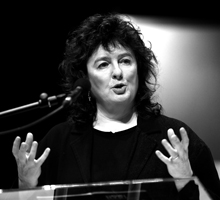Carol Ann Duffy
Carol Ann Duffy was born in Glasgow in 1955 into what was once called a working-class family. They moved to Stafford and the young Duffy found herself adjusting her speech in order to fit in:
‘I remember my tongue
shedding its skin like a snake, my voice
in a classroom sounding just like the rest.’
from Originally.
Luckily for Carol Ann Duffy (and for her readers) she had English teachers who encouraged her to write, drawing out her passion for language.
‘It taught me to love words for their own sake. Originally I liked stories and things, but by the time I was a teenager, poetry was my real love. It was at a time when poetry was more popular. Kids would go to poetry readings the way they would go to pop concerts’.
After school she met the Liverpool poet and artist Adrian Henri and later took a philosophy degree at the university of Liverpool. In the next decade she moved to London and became a full-time poet, publishing collections of poetry which were critically acclaimed, quickly popular with a wide audience and also won her a series of major poetry prizes. She now lives in Manchester with her daughter Ella. In 1995 she was awarded an OBE and in 2001 a CBE. She teaches poetry at Manchester Metropolitan University.
Her first poetry collection Standing Female Nude was published in 1985. This is how her editor Peter Jay at Anvil Books described the event ‘…when the typescript of Standing Female Nude arrived, not quite unsolicited because I said I would really like to see it, I accepted it by return of post. It has been a great pleasure to see how such an uncompromising poet, a poet who follows her own instincts and whose writing is quite unlike anyone else’s, has become – without any publicity hype – so seriously popular. She has simply got better, book by book.’
In 2009 Carol Ann Duffy was appointed Poet Laureate. Her latest collection The Bees is her first since becoming the Poet Laureate and won the 2011 Costa Poetry Award.
She has been a prolific and very popular laureate, writing on a number public events, including the MPs’ expenses scandal, the deaths of Harry Patch and Henry Allingham (the last surviving First World War veterans), the Post Office’s decision to do away with county names on letters, a response to the recent inquest into the Hillsborough tragedy; as well as putting together an anthology for the Queen’s jubillee, called Jubilee Lines, for which sixty poets contributed a poem each for every year of Elizabeth II’s reign.
